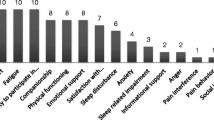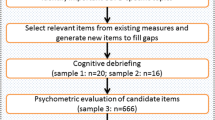Abstract
BOJECTIVE: Without clinical input on what constitutes a significant change, health-related quality of life (HRQoL) measures are less likely to be adopted by clinicians for use in daily practice. Although standards can be determined empirically by within-person change studies based on patient self-reports, these anchor-based methods incorporate only the patients’ perspectives of important HRQoL change, and do not reflect an informed clinical evaluation. The objective of this study was to establish clinically important difference standards from the physician’s perspective for use of 2 HRQoL measures among patients with chronic obstructive pulmonary disease (COPD).
DESIGN: We assembled a 9-person expert panel of North American physicians familiar with the use of the Chronic Respiratory Questionnaire (CRQ), a disease-specific HRQoL measure, or the generic Medical Outcomes Study Short-Form 36-Item Health Survey (SF-36, Version 2.0) among patients with COPD.
RESULTS: Using 2 rounds of the Delphi process, 1 in-person meeting, and an iterative improvement process for circulating and correcting the final report, the expert panel established small, moderate, and large clinically important change levels for the CRQ and SF-36.
CONCLUSIONS: For this expert physician panel, levels for detecting clinically important differences on the CRQ were equal to or slightly higher than previous studies based on patient-reported differences. Clinically important differences on the SF-36, Version 2.0, were noticeably larger than previous estimates based on cross-sectional differences between clinically defined patient groups.
Similar content being viewed by others
References
Murray C, Lopez A. Evidence-based health policy—lessons from the global burden of disease study. Science. 1996;274:740–3.
Eakin E, Sassi-Dambron D, Ries A, Kaplan R. Reliability and validity of dyspnea measures in patients with obstructive lung diseases. Int J Behav Med. 1995;2:118–34.
Mahler D, Weinberg D, Wells C, Feinstein A. The measurement of dyspnea. Contents, interobserver agreement, and physiologic correlates of two new clinical indexes. Chest. 1984;85:751–8.
Fletcher C, Elmes P, Fairbairn A, Wood C. The significance of respiratory symptoms and the diagnosis of chronic bronchitis in a working population. BMJ. 1959;2:257–66.
American Thoracic Society. Recommended respiratory disease questionnaire for use with adults and children in epidemiological research. Am Rev Respir Dis. 1978;118(suppl):7–53.
McGavin C, Artvinli M, Naoe H, McHardy G. Dyspnoea, disability, and distance walked: comparison of estimates of exercise performance in respiratory disease. BMJ. 1978;2:241–3.
Daughton D, Fix A, Kass I, Bell C, Patil K. Maximum oxygen consumption and the ADAPT quality-of-life scale. Arch Phys Med Rehabil. 1992;63:620–2.
Stoller J, Ferranti R, Feinstein A. Further specification and evaluation of a new clinical index for dyspnea. Am Rev Respir Dis. 1986;134:1129–34.
Weaver T, Narsavage G. Reliability and validity of Pulmonary Impact Profile Scale. Am Rev Respir Dis. 1989;139:A244.
Moody L. Measurement of psychophysiologic response variables in chronic bronchitis and emphysema. Appl Nurs Res. 1990;3:36–8.
Wigal J, Creer T, Kotses H. The COPD self-efficacy scale. Chest. 1991;99:1193–6.
Cox N, Hendriks J, Dijkhuizen R, Binkhorst R, van Herwaarden C. Usefulness of a medicopsychological questionnaire for lung patients. Int J Rehabil Res. 1991;14:267–72.
Lareau S, Carrieri-Kohlman V, Janson-Bjerklie S, Ross P. Development and testing of the pulmonary functional status and dyspnea questionnaire (PFSDQ). Heart Lung. 1994;23:242–50.
Guyatt G, Berman L, Townsend M, Pugsley S, Chambers L. A measure of quality of life for clinical trials in chronic lung disease. Thorax. 1987;42:773–8.
Tu S, McDonnell M, Spertus J, Steele B, Fihn S. A new self-administered questionnaire to monitor health-related quality of life in patients with COPD. Chest. 1997;112:614–22.
Barr J, Schumacher G, Freeman S, LeMoine M, Bakst A, Jones P. American translation, modification, and validation of the St. George’s Respiratory Questionnaire. Clin Ther. 2000;22:1121–45.
Guyatt G, King D, Feeny D, Stubbing D, Goldstein R. Generic and specific measurement of health-related quality of life in a clinical trial of respiratory rehabilitation. J Clin Epidemiol. 1999;52:187–92.
Hajiro T, Nishimura M, Tsukino M, Ikeda A, Koyama H, Izumi T. Comparison of discriminative properties among disease-specific questionnaires for measuring health-related quality of life in patients with chronic obstructive pulmonary disease. Am J Respir Crit Care Med. 1998;157:785–90.
Harper R, Brazier J, Waterhouse J, Walters S, Jones N, Howard P. Comparison of outcome measures for patients with chronic obstructive pulmonary disease (COPD) in an outpatient setting. Thorax. 1997;52:879–87.
Lacasse Y, Wong E, Guyatt G. A systematic overview of the measurement properties of the Chronic Respiratory Questionnaire. Can Respir J. 1997;4:131–9.
Jaeschke R, Singer J, Guyatt G. Measurement of health status: ascertaining the minimal clinically important difference. Control Clin Trials. 1989;10:407–15.
Juniper E, Guyatt G, Willan A, Griffith L. Determining a minimal important change in a disease-specific quality of life questionnaire. J Clin Epidemiol. 1994;47:81–7.
Barber B, Santanello N, Epstein R. Impact of the global on patient perceivable change in an asthma-specific QOL instrument. Qual Life Res. 1996;5:115–22.
Osoba D, Rodriques G, Myles J, Zee B, Pater J. Interpreting the significance of changes in health-related quality-of-life scores. J Clin Oncol. 1998;16:139–44.
Norman G, Stratford P, Regehr G. Methodological problems in the retrospective computation of responsiveness to change: the lessons of Cronbach. J Clin Epidemiol. 1997;50:869–79.
Wyrwich K, Tierney W, Wolinsky F. Further evidence supporting a SEM-based criterion for identifying meaningful intra-individual changes in health-related quality of life. J Clin Epidemiol. 1999;52:861–73.
Wyrwich K, Nienaber N, Tierney W, Wolinsky F. Linking clinical relevance and statistical significance in evaluating intra-individual changes in health-related quality of life. Med Care. 1999;37:469–78.
Redelmeier D, Guyatt G, Goldstein R. Assessing the minimal important difference in symptoms: a comparison of two techniques. J Clin Epidemiol. 1996;49:1215–9.
Lydick E, Epstein R. Interpretation of quality of life changes. Qual Life Res. 1993;2:221–6.
McHorney C, Ware J, Rogers W, Raczek AE, Lu JF. The validity and relative precision of MOS short and long-form health status scales and Dartmouth COOP charts: results from the Medical Outcomes Study. Med Care. 1992;30(suppl):253–65.
Brazier J, Harper R, Jones N, et al. Validating the SF-36 health survey questionnaire: new outcome measure for primary care. BMJ. 1992;305:160–4.
Stewart A, Greenfield S, Hays R, et al. Functional status and well-being of patients with chronic medical conditions: results from the Medical Outcomes Study. JAMA. 1989;262:907–13.
Brook R, Chassin M, Fink A, Solomon D, Kosecoff J, Park R. A method for the detailed assessment of the appropriateness of medical technologies. Int J Technol Assess Health Care. 1986;2:53–63.
Moore A, Morton S, Beck J, et al. A new paradigm for alcohol use in older persons. Med Care. 1999;37:165–79.
Campbell S, Hann M, Roland M, Quayle J, Shekelle P. The effect of panel membership and feedback on ratings in a two-round delphi survey. Med Care. 1999;37:964–8.
McGlynn E, Kosecoff J, Brook R. Format and conduct of consensus development conferences: multi-nation comparison. Int J Technol Assess Health Care. 1990;6:450–69.
Dalkey N. The Delphi Method: An Experimental Study of Group Opinion. Santa Monica: Rand Corporation; 1969.
Clancy C, Eisenberg J. Outcomes research: measuring the end results of health care. Science. 1998;282:245–6.
Stewart A, Hays R, Ware J Jr. The MOS Short-Form General Health Survey: reliability and validity in a patient population. Med Care. 1988;26:724–35.
Shekelle P, Kahan J, Bernstein S, Leape L, Kamberg C, Park RE. The reproducibility of a method to identify the overuse and underuse of medical procedures. N Engl J Med. 1998;338:1888–95.
Stasser G, Kerr N, Davis JH. Influence processes and consensus models in decision-making groups. In: Paulus P. ed. Psychology of Group Influence, 2nd ed Hillsdale, NJ: Lawrence Erlbaum Associates, Inc.; 1989.
Neymark N, Kiebert W, Torfs K, et al. Methodological and statistical issues of quality of life (QOL) and economic evaluation in cancer clinical trials-report of a workshop. Eur J Cancer. 1998;34(9):1317–33.
Author information
Authors and Affiliations
Corresponding author
Additional information
This research was funded by grants from the Agency for Healthcare Research and Quality to Dr. Wolinsky (R01 HS10234) and Dr. Wyrwich (K02 HS11635).
Rights and permissions
About this article
Cite this article
Wyrwich, K.W., Fihn, S.D., Tierney, W.M. et al. Clinically important changes in health-related quality of life for patients with chronic obstructive pulmonary disease. J GEN INTERN MED 18, 196–202 (2003). https://doi.org/10.1046/j.1525-1497.2003.20203.x
Issue Date:
DOI: https://doi.org/10.1046/j.1525-1497.2003.20203.x




